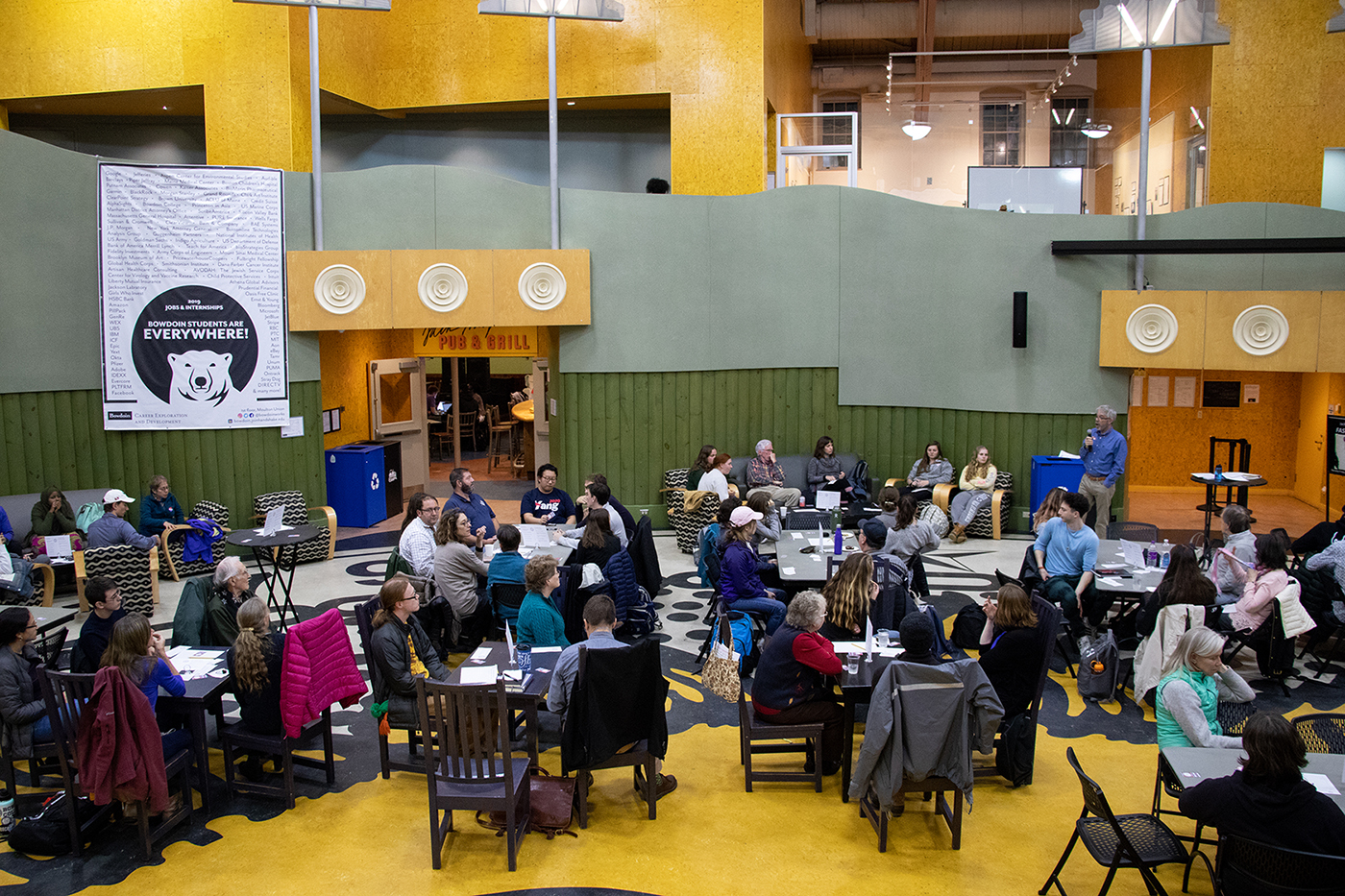Coffee house program takes strides against political animosity
November 8, 2019
 Sophia Wei
Sophia WeiBowdoin students and members of the greater Brunswick community exchanged ideas on the role of the American government and enjoyed live music on Tuesday in Morrell Lounge.
The event marked the third installment of the What Matters Community Crossover, a four-part program spearheaded by the Joseph McKeen Center for the Common Good. Associate Director of the McKeen Center Tom Ancona believes that these conversations are a useful way for students to be introduced to a wide variety of political views.
“The goal for us this year was to establish greater ties with community members and allow the students not only to hear different political perspectives but also people from different generations and from different backgrounds,” Ancona said. “[We try] to get people from a broad group of perspectives—not to debate one another but to explain their perspective, where they’re coming from, what their background is and why they believe what they believe.”
The event was co-sponsored by Make Shift Coffee House, an organization that aims to bridge understanding and commonality in contemporary political discussions. Craig Freshley, the group’s founder, moderated Tuesday’s discussion. He emphasized the importance of listening to understand instead of jumping to conclusions and judgements.
“It really upsets me to see how divided we are as a country … we’re not understanding each other’s points of view and showing a lot of disrespect in our conversations,” said Freshley. “I decided, you know what, I’m gonna have a meeting where people really talk to each other face to face with respect.”
Freshley noted the importance of representing well-balanced ideas across the political spectrum and how Bowdoin was able to deliver that at the event.
“We work really hard to get people with different opinions in the room; it doesn’t just happen overnight,” said Freshley. “For one thing, [at Bowdoin] we get a wonderful age mix. That’s what makes it really rich. Secondly, we get community mix—we get people from the community coming in here to vote. Thirdly, you have a huge diversity of race and ethnicity and political views within the student body that people from outside the community don’t generally get exposed to.”
Leif Maynard ’23, who attended the event Tuesday, was one of 13 students who traveled to Richmond, Maine as a part of the program. In his political discourse with others, he noticed a tendency for political discourse to be affirming rather than challenging the ideas of established authority.
“It’s interesting to me coming to Bowdoin, which is an institution that I feel really prioritizes consensus building over really looking at progressive change,” Maynard said. “While I believe that consensus building is really important, I also think it’s important to challenge consensus with the established authority.”
Maynard thinks of the discussion as an exercise on stepping out of one’s comfort zone and understanding the perspectives of people who would otherwise be dismissed with labels or stereotypes.
“I want people to realize that nothing is going to be as healthy or productive as talking to someone face to face … you can maintain your own political identity, even when you’re communicating with people [with whom you disagree],” he said. “You should be confident enough in your ideology to engage in civil discourse like this and respect other people’s humanity.”
Ancona echoed this idea by clarifying that while the activity was not meant to reconcile differences, it should add compassion into what would otherwise be vehement disagreements.
“I don’t expect that somebody coming from this conversation is going to say, ‘I agree with you.’ In fact, they may have greater disagreements. But hopefully they gain an appreciation for why that person believes what they do,” Ancona said. “I think that that leads to tremendous benefits for everyone.”
Comments
Before submitting a comment, please review our comment policy. Some key points from the policy:
- No hate speech, profanity, disrespectful or threatening comments.
- No personal attacks on reporters.
- Comments must be under 200 words.
- You are strongly encouraged to use a real name or identifier ("Class of '92").
- Any comments made with an email address that does not belong to you will get removed.

I am an evangelical, conservative Christian Counselor living now in Greenville, South Carolina. I have been concerned about the lack of free speech on campuses nationally and decided to do some research on Bowdoin today. Looks as if Bowdoin is holding strong on free speech and diversity of both religious and political views. Dr. Rick Barr, class of ’70